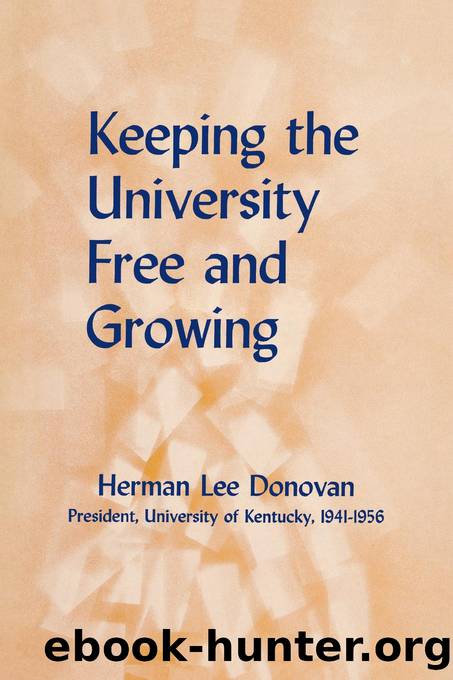Keeping the University Free and Growing by Donovan Herman Lee;

Author:Donovan, Herman Lee; [Donovan, Herman Lee]
Language: eng
Format: epub
Publisher: University Press of Kentucky
Published: 2021-08-15T00:00:00+00:00
CHAPTER NINE
The Vanishing University Trustee
SINCE the establishment of the earliest colleges in America, both public and private, charters and statutory provisions have provided for boards of trustees or regents to determine and administer policies for these institutions of higher learning. In order to provide for the greatest amount of freedom in teaching, our founding fathers saw the necessity for independent governing bodies for institutions that were created to give instruction to the youth of our country. On the whole, the charters, body of laws, and, in a number of instances, state constitutions have given these governing boards very broad authority and have not encumbered their work by limiting their control over the colleges and universities.
Through statutory provisions Kentucky, like other states in the Union, early placed its institutions of higher education in the hands of boards of trustees or regents, and made it possible for these boards to act on their own best judgment with regard to the administration of these institutions. Only in recent years has there been a tendency to take away from governing boards their administrative authority, and to transfer to other State agencies one power after another. State agencies are chipping away the authority long exercised by the trustees of educational institutions, and the universities are slipping away from them. The issue is whether the trustees and the president administer the university, or someone else runs the university. Rapidly we are nearing the time when very little authority will reside in a board of trustees or regents, except by suffrance of those agencies that actually have control over many of the college activities. While the powers and duties of the trustees and regents are being eroded from time to time, the public is scarcely aware of what is taking place.
Trustees are generally appointed by the governor, but in a few states they are elected by the people. The length of their term is usually longer than that of other state officials, four years being about the minimum term found in any state, and terms of six, eight, ten, and even twelve years being not uncommon. Governors usually reappoint trustees when their terms expire. The office is not commonly regarded as political. A strong public sentiment has developed in this country that the trustee of a college or university should be free of any political entanglements, so that he should be completely independent in his deliberations as a member of its governing board. Boards of college trustees have been on the whole the most independent bodies to be found in our society. The subtle attack on their authority has been so stealthy that many trustees are not yet aware of what had happened to these boards. Unless this trend is reversed, the trustee will shortly discover that he is a figurehead with little control over the institution that he is supposed to guide and direct.
The âExecutive Budget,â promoted with great enthusiasm by the Council of State Governments, has done much to transfer the control of all state
Download
This site does not store any files on its server. We only index and link to content provided by other sites. Please contact the content providers to delete copyright contents if any and email us, we'll remove relevant links or contents immediately.
Waking Up in Heaven: A True Story of Brokenness, Heaven, and Life Again by McVea Crystal & Tresniowski Alex(37782)
Still Foolin’ ’Em by Billy Crystal(36346)
Cecilia; Or, Memoirs of an Heiress — Volume 1 by Fanny Burney(32538)
Cecilia; Or, Memoirs of an Heiress — Volume 2 by Fanny Burney(31936)
Cecilia; Or, Memoirs of an Heiress — Volume 3 by Fanny Burney(31925)
Fanny Burney by Claire Harman(26591)
Empire of the Sikhs by Patwant Singh(23069)
We're Going to Need More Wine by Gabrielle Union(19032)
Hans Sturm: A Soldier's Odyssey on the Eastern Front by Gordon Williamson(18565)
Plagued by Fire by Paul Hendrickson(17401)
Out of India by Michael Foss(16843)
All the Missing Girls by Megan Miranda(15929)
Cat's cradle by Kurt Vonnegut(15326)
Pimp by Iceberg Slim(14477)
Molly's Game by Molly Bloom(14131)
Bombshells: Glamour Girls of a Lifetime by Sullivan Steve(14046)
For the Love of Europe by Rick Steves(13875)
Leonardo da Vinci by Walter Isaacson(13310)
4 3 2 1: A Novel by Paul Auster(12364)
